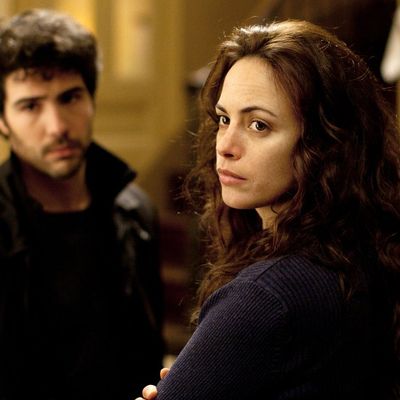
Asghar Farhadi’s The Past, the follow-up to his much-admired A Separation, is set on the outskirts of Paris and moves at the speed of tectonic plates. It’s absorbing for a long while, at least half its two-hour running time — an evocatively photographed soap opera with actors who are impossibly gorgeous and yet human-looking — but it goes on and on, piling on twists, adding devices so clunky they’d have embarrassed most nineteenth-century problem-dramatists, refusing to jell despite the actors’ prodigious suffering. It’s as if Farhadi became too depressed by his own cynicism to keep the drama humming. The movie turns into a dour demonstration of missed connections.
The darkly handsome Iranian actor Ali Mosaffa plays Ahmad, a man who returns from a spell in Iran to see Marie (Bérénice Bejo), his lovely [redacted], and finalize his [redacted], as well as renew his relationship with [redacted].
I’m redacting plot details because much of the film’s spell — and later its torpor — is in how Farhadi parcels out information: a teeny-weeny bit at a time. Refusing to orient the viewer is a good storytelling trick and conforms to Farhadi’s idea that people who don’t say what’s really on their minds (holding back either for emotional or political reasons) act out in all sorts of destructive ways. The movie would be less intriguing if we weren’t asking for the first hour: Who is this guy? And: Why did he go to Iran? And: Are those two daughters his as well as hers? And: What happened to the wife of Marie’s lover, Samir (Tahar Rahim), whose little boy, Fouad (Elyes Aguis), seems so damaged? For a while Farhadi keeps you glued to the screen, scrutinizing his characters’ (excellent) faces as they struggle with momentous decisions. The truth liberates — and lacerates.
Farhadi has a gift for the penetrating close-up, and he’s terrific at cutting among his characters to bring out every unspoken emotion. When you compare this to John Wells’s film of August: Osage County, the difference is stark: Wells uses old TV-style close-ups, every cut on the nose, while Farhadi layers the space with clutter and walls (some transparent) that keep people from fully communicating. There is, once more, a separation. Ahmad is forced to become a sort of detective. Why is Marie’s teenage daughter Lucie (Pauline Burlet) so tense and angry — staying away from home despite the presence of Ahmad, whom she clearly adores? What does Marie expect from Ahmad, and why has she put him up in her house instead of at a hotel?
Mosaffa has wary, watchful eyes and a soft demeanor. You know why Lucie feels safe with him and why Marie seems unable to let him go. But while Bejo is very, very beautiful (and hard to recognize as the exuberant flapper from The Artist), Marie is an enigma, and not an especially fascinating one. Does she always have a hair-trigger or is this just a particularly stressful period? Was she impossible to live with, or are the men in her life unusually feckless? The only thing that’s clear is that the children are suffering for their parents’ failures of will. Otherwise, the characters refer constantly to a past that doesn’t come alive except as a literary conceit. You don’t even see it through a glass darkly. It’s too smudged.
A Separation might have been overrated, but Farhadi was working in Iran and had a crystalline theme — that no individuals were bad, that the evil was in the ecosystem. The hopelessness of The Past, on the other hand, feels imposed instead of organic. And the pacing in the last hour is unforgivably sluggish. Farhadi introduces all sorts of hopeful melodramatic devices and then drops them in the name of a larger hopelessness. The movie is like a gradually induced coma.


